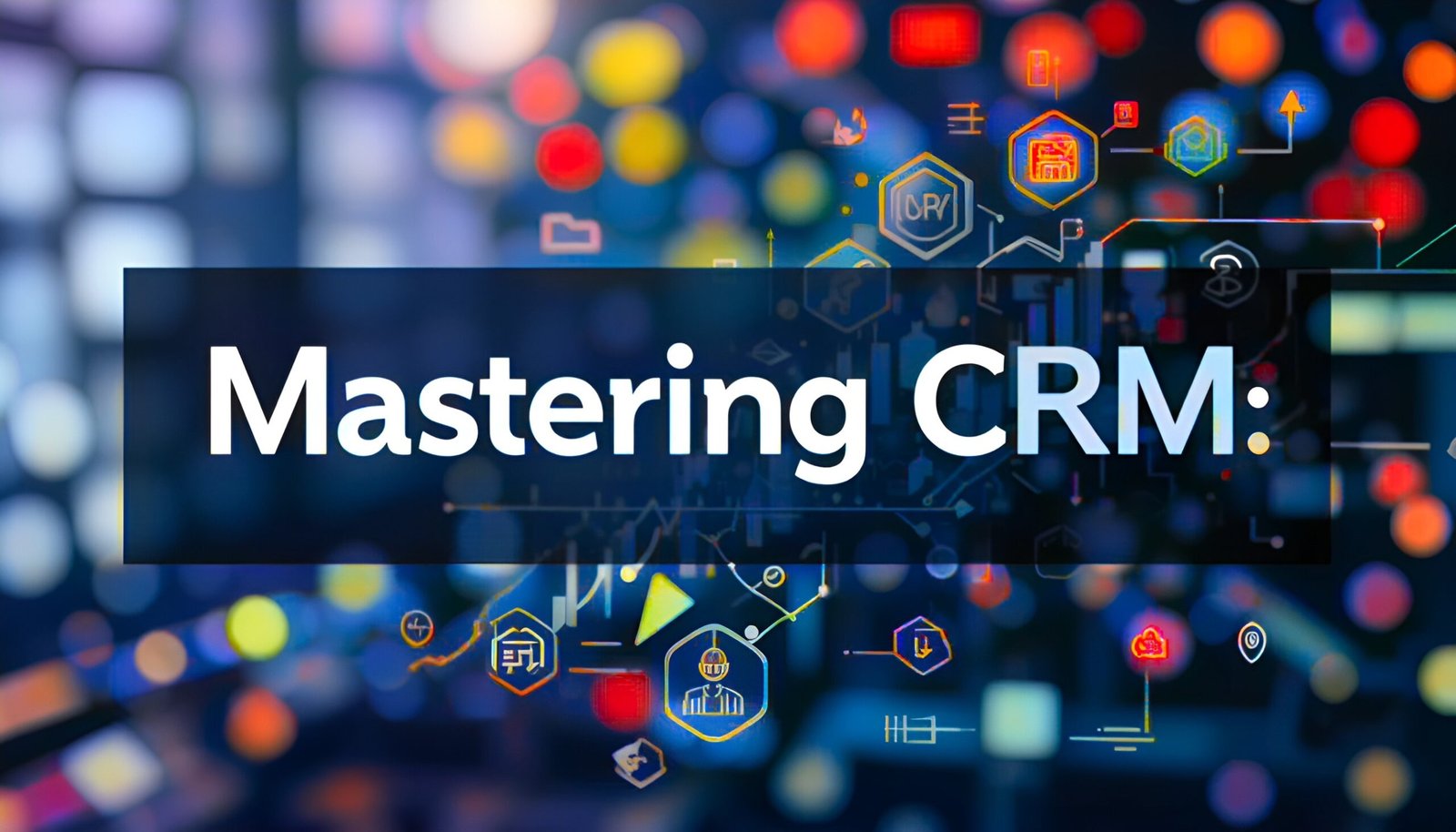Now Reading: Enhancing Sales Performance: Your CRM Guide
- 01
Enhancing Sales Performance: Your CRM Guide

Enhancing Sales Performance: Your CRM Guide
Introduction
In today’s dynamic business landscape, achieving peak sales performance is paramount for sustainable growth and profitability. Customer Relationship Management (CRM) systems have emerged as indispensable tools for businesses seeking to optimize their sales processes, nurture customer relationships, and ultimately, drive revenue. A CRM is more than just a software; it’s a strategic approach to managing interactions with current and potential customers, streamlining operations, and improving profitability [1][2]. By centralizing customer data and automating key sales activities, a well-implemented CRM empowers sales teams to work smarter, not harder, leading to significant improvements in sales performance.
This guide will explore how businesses can leverage CRM systems to enhance their sales performance, covering essential features, strategic implementation, and best practices for user adoption and success measurement.
Understanding the CRM Advantage for Sales
At its core, a CRM system is designed to unify customer and company data from various sources, providing a single, accessible source of truth [3]. This centralized approach offers numerous benefits that directly impact sales performance:
- More Productive Sales Teams: CRM systems organize sales teams, providing insights and tools to close deals more efficiently. By automating routine tasks like data entry and follow-up emails, CRMs free up valuable time for sales representatives to focus on building relationships and engaging with prospects [4]. CRM provides the insights and tools needed to prioritize efforts, manage time effectively, and ultimately, boost productivity.
- Single View of the Customer: A CRM provides a 360-degree view of each customer, consolidating all interactions, purchase history, preferences, and communications in one place. This holistic view enables sales teams to understand their customers better, personalize interactions, and tailor their approach to individual needs, leading to improved customer satisfaction and loyalty [5].
- Actionable Analytics and Data Dashboards: CRM systems analyze customer data and generate insightful reports and dashboards. These analytics provide real-time visibility into sales performance, pipeline health, conversion rates, and customer behavior trends. By tracking key performance indicators (KPIs), businesses can identify areas for improvement, optimize sales strategies, and make data-driven decisions to boost revenue [6].
- Customer-Centric Automation: CRM platforms automate various customer-facing and internal processes, ensuring consistent and personalized communication across all touchpoints. Automation capabilities include automated email sequences, lead scoring, task management, and workflow automation, which streamline sales processes, improve efficiency, and reduce the risk of human error [7].
- Simplified Collaboration: A CRM facilitates seamless collaboration across sales, marketing, customer service, and other departments. By sharing customer data and interaction history, teams can work together more effectively, ensuring a unified and consistent customer experience [8].
Essential CRM Features for Sales Performance
To effectively enhance sales performance, a CRM system should incorporate several key features:
- Contact Management: This foundational feature stores comprehensive customer details, interaction history, and communication preferences in a searchable database [9].
- Lead Management: CRM systems streamline lead management by capturing leads from various sources, scoring and prioritizing them based on predefined criteria, and nurturing them through the sales pipeline [10].
- Sales Pipeline Management: This feature provides a visual representation of the sales process, allowing sales teams to track deals through different stages, from initial contact to closure [11].
- Sales Automation: CRM systems automate repetitive sales tasks, such as sending follow-up emails, scheduling appointments, and updating lead statuses [12].
- Reporting and Analytics: Robust reporting and analytics capabilities are crucial for measuring sales performance and identifying areas for improvement [13].
- Email Integration: Seamless email integration allows sales teams to manage email communications directly within the CRM, track email interactions, and automate email campaigns [14].
- Workflow Automation: This feature enables businesses to automate complex sales processes and workflows, ensuring consistency and efficiency [15].
- Mobile CRM: Mobile CRM functionality allows sales teams to access and update customer data, manage tasks, and track sales activities from anywhere, at any time [16].
Strategic CRM Implementation for Sales Enhancement
Implementing a CRM system is a strategic undertaking that requires careful planning and execution. To maximize its impact on sales performance, businesses should consider the following strategies:
- Define Clear Goals and Objectives
- Identify Your Target Customer and Map the Customer Journey
- Choose the Right CRM System
- Data Migration and Integration
- Customize CRM to Fit Business Needs
- Prioritize User Adoption and Training
- Automate Repetitive Tasks
- Personalize Customer Experiences
- Regularly Monitor and Analyze Data
- Continuously Improve and Adapt CRM Processes
Measuring CRM Success: Key Performance Indicators (KPIs)
To determine the effectiveness of a CRM system in enhancing sales performance, it’s crucial to track relevant Key Performance Indicators (KPIs). These metrics provide quantifiable insights into the impact of CRM on sales outcomes:
- Sales Revenue
- Sales Growth Rate
- Average Deal Size
- Sales Cycle Length
- Conversion Rate
- Customer Retention Rate
- Customer Satisfaction Score (CSAT)
- Customer Lifetime Value (CLTV)
Humanizing CRM for Enhanced User Adoption
While CRM systems offer powerful capabilities, user adoption is often a challenge. To ensure sales teams embrace and effectively utilize the CRM, it’s essential to humanize the implementation and usage process:
- Tailor Technology to Support Processes
- Give Your Teams a Voice
- Identify CRM Champions
- Communicate CRM Benefits Clearly
- Provide Role-Specific Training and Support
- Gamify CRM Usage
- Lead by Example
Conclusion
Enhancing sales performance in today’s competitive market requires a strategic and customer-centric approach. CRM systems provide the tools and capabilities to streamline sales processes, deepen customer relationships, and drive revenue growth. By understanding the benefits of CRM, implementing essential features, adopting strategic implementation practices, and focusing on user adoption, businesses can effectively leverage CRM to achieve significant improvements in sales performance and build a sustainable competitive advantage. Embracing a CRM is not just about adopting a software; it’s about embracing a customer-centric philosophy that empowers sales teams and drives business success.
Frequently Asked Questions (FAQ)
Q1: What is a CRM and how does it benefit sales? A: CRM stands for Customer Relationship Management. It is a system for managing a company’s interactions with current and potential customers. CRM benefits sales by centralizing customer data, automating tasks, providing insights, and improving team collaboration, leading to increased efficiency, better customer relationships, and higher sales performance.
Q2: What are the essential features of a CRM for sales? A: Essential CRM features for sales include contact management, lead management, sales pipeline management, sales automation, reporting and analytics, email integration, workflow automation, and mobile CRM access.
Q3: How can a CRM help improve sales team productivity? A: CRM systems automate routine tasks, streamline workflows, provide easy access to customer information, and offer tools for better organization and collaboration. This allows sales teams to focus on selling activities, reduce administrative burden, and improve overall productivity.
Q4: What are some key KPIs to measure CRM success in sales? A: Key KPIs for measuring CRM success in sales include sales revenue, sales growth rate, average deal size, sales cycle length, conversion rate, customer retention rate, customer satisfaction score, and customer lifetime value.
Q5: How can businesses ensure successful CRM user adoption? A: To ensure successful CRM user adoption, businesses should tailor the CRM to support existing processes, involve teams in the implementation process, provide comprehensive training and support, communicate CRM benefits clearly, and lead by example from management.
References
[1] – CRM Optimization Tips and Best Practises: Improve Efficiency and Boost Sales – OMI – https://www.omi.co/crm-configuration/4-ways-to-update-your-crm-system/
[2] – What Is CRM (Customer Relationship Management)? – Salesforce India – https://www.salesforce.com/in/crm/what-is-crm/
[3] – The 11 Greatest Benefits of CRM Platforms – Salesforce India – https://www.salesforce.com/in/crm/benefits-of-crm/
[4] – What is a sales CRM, and how does it help businesses grow? – Zendesk – https://www.zendesk.com/blog/sales-crm /
[5] – 7 Ways on How Does CRM Help Sales Professionals – Freshworks – https://www.freshworks.com/crm/how-does-crm-help-sales/
[6] – Top CRM Features and Functions for Businesses – NetSuite – https://www.netsuite.com/portal/resource/articles/erp/crm-features-functions.shtml
[7] – Crafting a Winning CRM Strategy for Driving Sales in 2025 – Guide – DynaTech Systems – https://dynatechconsultancy.com/blog/crafting-a-winning-crm-strategy-for-driving-sales
[8] – How to Create a CRM Strategy That Drives Sales and Loyalty (2024) – Asana – https://asana.com/resources/crm-strategy
[9] – How to optimize sales processes with your CRM – Parkour3 – https://www.parkour3.com/en/blog/how-to-optimize-sales-processes-with-your-crm
[10] – 13 CRM Strategies to Improve Your Business (With Examples) – NetSuite – https://www.netsuite.com/portal/resource/articles/erp/crm-strategies.shtml
[11] – CRM KPIs and Metrics to Track and Measure to Increase Sales – Sloovi – https://sloovi.com/blog/crm-kpis/
[12] – 38 Top CRM KPIs & Metrics to Track (and Measure Sales Success) – Close – https://www.close.com/blog/crm-kpis
[13] – 6 Best Practices to Drive CRM Adoption – SugarCRM – https://www.sugarcrm.com/blog/best-practices-drive-crm-adoption/
[14] – Mastering CRM Adoption: Best Practices, Benefits, Metrics and Challenges Explained with Actionable Tips – ADA-Asia – https://www.adaglobal.com/resources/insights/crm-adoption-best-practices
[15] – Advantages of CRM: 10 top benefits for your team – Zendesk – https://www.zendesk.com/au/blog/top-crm-benefits-sales-support-teams/
[16] – CRM: Which 7 essential features should a CRM have for your business success? – Next-Consult – https://next-consult.com/crm-which-7-essential-features-should-a-crm-have-for-your-business-success/

























